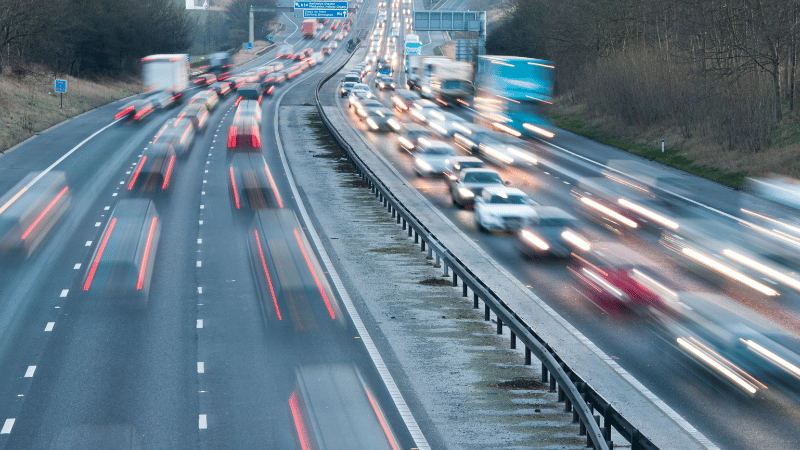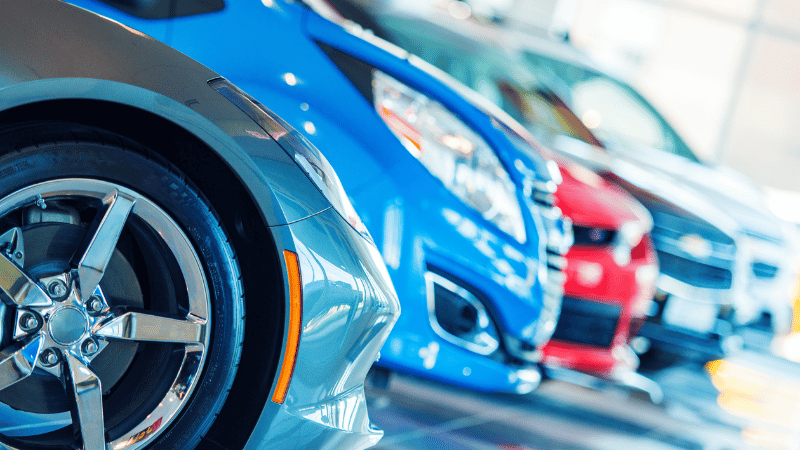Categories
Hire Purchase vs PCP | A Complete Comparison

In a nutshell, HP is suitable for those focused on ownership and saving on long-term costs, while PCP is better for those valuing flexibility, lower upfront costs, or easier access to new cars.
But, there's a little more to it than that...
Let's start with a birds-eye view of the comparison, and we'll then go through all the pros and cons in more detail.
General Overview
- HP and PCP are car finance options allowing payments over time instead of upfront.
- In both cases, the finance company owns the car until the agreement concludes.
- Both options can lead to full ownership or repossession if payments are missed.
Financial Structures
Hire Purchase (HP):
- Larger upfront deposit (~10% of car value).
- Regular monthly payments spread evenly over 3-5 years.
- Nominal or no fee at the end to transfer ownership.
- Total cost typically lower than PCP due to reduced interest.
- Ideal for those who prioritise ownership.
Personal Contract Purchase (PCP):
- Smaller or zero initial deposit.
- Lower monthly payments (based on depreciation, not total car value).
- Significant final “balloon payment” (Guaranteed Minimum Future Value, GMFV) to own the car.
- Offers flexibility at the end: keep the car, return it, or trade for a new one.
- Ideal for flexibility and access to newer cars.
Cost Comparison
- PCP monthly payments are typically 30%-40% lower than HP.
- But HP is more cost-effective for total ownership.
- PCP may incur additional fees (e.g., excess mileage, car condition).
Flexibility
Personal Contract Purchase (PCP):
- Great for those unsure about long-term ownership.
- Allows decision-making at the end of the term.
- Mileage limits apply (fees for exceeding them).
Hire Purchase (HP):
- Simpler structure for outright ownership.
- No mileage restrictions.
Use Cases
- HP: Often best for low-value or older cars.
- PCP: Well-suited for new or high-value vehicles due to lower initial and monthly costs.
Limitations & Considerations
- Both require maintaining the car in good condition.
- PCP contracts often include mileage and usage limitations.
- Both options charge fees for early termination, though flexibility exists.
Let's explore each aspect in more detail and provide some examples to illustrate the differences.
And to compare rates and quotes from multiple lenders, get a quick quote:
*Note: minimum loan size of £50,000 for individuals, and £25,000 for business purchases

An Overview of HP and PCP
Both very common forms of car finance, hire purchase and personal contract purchase (PCP) offer buyers a way to pay for a car over the next few years, rather than having to come up with the capital in one hit.
- They are both contracts with a finance provider who technically owns the car throughout the agreement, transferring ownership to you only at the end of the deal (if you choose to keep it).
- They both involve offsetting the flexibility of buying the car with monthly payments with the additional cost of ongoing interest.
- They both can end in you owning the car outright.
- They both can result in repossession if you fail to keep up with the monthly repayments.

The Financial Structures of HP and PCP
With both HP and PCP, the idea is that you pay for your car over time.
Neither of them will produce a magic result where you end up with the car without having paid for it, so the overall money spent if you want to own the car is very similar - while there are some subtle differences based on the interest calculations, which we’ll discuss in a bit, the total spend is very close.
The difference is all in the structure.
This means that while at the end of an HP contract you own the car, at the end of a PCP one, you are provided with a three-way choice (the technical word for this is a ‘trilemma’!):
- Pay the remaining money and own the car
- Give the car back, walk away, and owe nothing
- Upgrade to a new PCP agreement on another car
This flexibility is one of the things that makes a PCP agreement so enticing - you don’t have to make a decision on day one, instead, wait until day 1000 or so!
By that point, you’ll know your real financial situation, you’ll know whether you love the car or want rid of it, and you’ll be able to make an informed decision about your options.
Making the choice at the end of the agreement is actually one of the things that makes PCP not a ‘trilemma’, as the definition of ‘trilemma’ is a difficult three-way choice, and with all the experience and information you have, it shouldn’t be difficult at all!
HP Finances in Detail
Jumping back to hire purchase, let’s take a look at how this basic agreement works:
Though it’s not often spoken about, there’s also an additional end fee with HP, called the option-to-buy. This often-nominal value covers the cost of administration in passing ownership from the finance company to you. It’s usually between £50 and £200 and can even be zero in some agreements.
Let’s take a look at this in practice.
Consider a car worth £28,000. The deposit would be £2,800, leaving £25,200 to be paid over the agreement term. A five-year HP deal at 9.4% would result in 60 monthly repayments of £528.02, with a total repayment (including the deposit) of £34,480.97.
A £200 option-to-buy fee at the end of the contract would raise this total to £34,680.97.
The following table shows a range of potential HP agreements broken down:
HP Examples
|
Car Value |
Interest Rate |
Terms (months) |
10% Deposit |
Monthly Payment |
Option-to-buy |
Total |
|
£12,000 |
10.5% |
36 |
£1,200 |
£351.03 |
£100 |
£13,936.95 |
|
£14,995 |
10.2% |
48 |
£1,499.50 |
£343.58 |
£50 |
£18,041.26 |
|
£28,650 |
9.8% |
60 |
£2,865 |
£545.32 |
£125 |
£35,709.26 |
|
£40,000 |
9.8% |
36 |
£4,000 |
£1,158.24 |
£0 |
£45,696.69 |
As can be seen, a HP structure has:
- Larger initial payment (deposit)
- Large monthly payments
- Small or zero additional final payment
Like all loans, the speed at which the balance of the loan is paid off affects the interest accrued.

PCP Finances in Detail
The financial structure of personal contract purchase is a little more complicated than HP, due to the flexibility of the deal.
At the end of the PCP agreement, if you want to keep the car, you will have a final balloon payment (so-called because it’s significantly larger, or more ‘inflated’, than all the others).
The balloon payment is a calculated value based on the expected depreciation of the car - the ‘guaranteed minimum future value’.
When you pay monthly for a PCP, you are actually paying the depreciation in that car plus the interest on the balance.
Depreciation is the amount of market value the car loses over time, and while it cannot be predicted with absolute accuracy, a very close estimate can be made. The GMFV is the predicted value of the car once the agreement is over.
The GMFV is calculated and set at the beginning of the agreement, it is a ‘guaranteed minimum’ because even if in reality the car’s value falls to below this level, both you and the finance company agree to treat it as if it is this value.
If you choose to keep the car once the contract term is over, it is the GFMV that you must pay as your final balloon payment, effectively buying the car after its years of faithful service. As it is calculated in advance, it never comes as a surprise and can be easily planned for.
With the larger payments for PCP at the end of the agreement rather than the beginning, it’s a far easier system for those looking to buy a car without the capital available upfront; a feature that makes it much more accessible for people who find themselves needing a car when they don’t have significant savings to pay for it.
In addition to the monthly repayments and the final balloon payment, PCP deals also often have a larger initial payment, also sometimes called the PCP deposit.
This initial payment is typically equal to three, six, or nine months of regular payments, though many providers are willing to offer PCP deals without an additional initial payment.
Let’s look at some PCP deals similar to the HP examples used above, using the same car values, interest rates, and contract terms:
PCP Examples
|
Car Value |
Interest Rate |
Terms (months) |
Initial Payment (months) |
Initial Payment |
Monthly Payment |
GFMV |
Total |
|
£12,000 |
10.5% |
36 |
3 |
£675 |
£226 |
£6,000 |
£14,811 |
|
£14,995 |
10.2% |
48 |
0 |
£0 |
£267 |
£6,750 |
£19,566 |
|
£28,650 |
9.8% |
48* |
6 |
£2,750 |
£458 |
£11,460 |
£36,194 |
|
£40,000 |
9.8% |
36 |
6 |
£4,050 |
£676 |
£20,000 |
£48,368 |
* the earlier hire purchase example was set to 60 months (5 years). PCP agreements are for 48 months or less; the figure is adjusted accordingly.
So, PCP represents:
- Smaller initial payment (deposit)
- Smaller monthly payments
- Potentially large final balloon payment based on GFMV

Comparing HP and PCP Finance
Looking only at the numbers, there are already clear advantages and disadvantages of each finance method:

Initial payments
The deposit for hire purchase is almost always greater than a PCP equivalent.
Almost all finance providers use a base rate of 10% as the deposit, which is comparable to a six-month PCP initial payment.
As many PCP deals offer 3-month or 0-month deposits, there is far more opportunity to save on the initial payment with PCP.
It should be noted, however, that in both HP and PCP situations, there is room to negotiate on the initial payment, either looking to lower it for ease of capital expense, or to raise it to lower the total financing and thus both monthly repayments and interest.

Monthly payments
Once more, PCP is a clear winner. As you are only paying for the depreciation of the vehicle, PCP represents a far smaller monthly outgoing, with payments often 30% to 40% cheaper.

Final balloon payments
With only the nominal option-to-buy fee associated with hire purchase, the cost of a PCP final GMFV balloon payment is considerable. Remember, however, this is an optional payment for car ownership and you can choose to simply hand the car back instead.

Interest paid
By rapidly lowering the principal of the financing agreement, the overall cost of car ownership with HP is lower than that of PCP, even accounting for the final balloon payment. Savings are greater when the interest rate of the deal is higher.

Possible return
With PCP, there’s a chance that the car’s market value at the end of the term is greater than the GFMV.
On these occasions, you will be reimbursed the difference if you choose to hand back the car. This is especially useful if you’re looking to upgrade to a newer car and another PCP agreement as this boost may provide the capital needed to act as the initial payment of the next deal.

Fees
PCP agreements do come with some extra considerations, such as a mileage limit. Should you exceed this, you will be charged a fee based on the excess mileage. There is no similar consideration for HP deals.

HP vs. PCP - Non-Financial Considerations
The financial side of the argument only tells half the story.
Personal contract purchase is an agreement that’s more in-tune with the modern approach to personal finance; consequently, there are a number of factors that set the two car finance arrangements apart.

Instant Convenience
Life happens and sometimes we’re not completely prepared for the ups and downs.
Walking into a dealership armed with nothing but the right paperwork and an average credit rating is enough in many cases to leave with a car using PCP (even if you have to wait for it to be delivered). It’s a lot harder to do the same with HP.
It should be noted that 0% deposit HP deals exist, but they are rarer and finance companies are far more likely to want you to have some capital of your own to invest in the car.
Because you don’t need to have built-up savings to get a PCP deal, many people see it as a superior choice.

Both Used and New Cars
Both HP and PCP can be used to get both new and used cars, making this an almost equal score.
However, older cars and low-value cars may be rejected for a PCP agreement. Because PCP is calculated based on a GMFV at the end of the term, if this calculation results in a zero, or very low value, PCP simply isn’t appropriate and HP will be offered in its place.
Cars valued at £5,000 or less are unlikely to be considered appropriate for PCP financing.
On the other end of the scale, both PCP and HP are cost-efficient methods for obtaining brand-new cars, with the lower upfront cost and lower monthly payments of PCP making it the perfect finance for many to be able to afford the latest technology, safety, and comfort.

Ownership and Flexibility
In the past, owning your car was seen to be important - conferring status as well as providing a feeling of security. Today, however, the market is very different and car leasing is often preferable, with the opportunities for upgrading and getting access to newer vehicles seen as more important than long-term ownership.
Hire purchase caters very well for those who have a reason to own their car, and is structured with that in mind from the beginning.
PCP, on the other hand, understands that circumstances may change and by the time you’ve been driving your car for a few years, you may want a change.
The flexibility of PCP also means there’s no need to make that decision until you’re in the final weeks of your contract. If, at the last minute, you decide you do want to keep it, then it’s just a case of paying the balloon payment - and even that isn’t as hard as it may seem, as you can use other financing options to help if you don’t have the available cash.
PCP allows you to move gently from ownership to long-term leasing. There’s no pressure to switch your car for a new one at the end of the term; just the temptation that you might want to.

Limitations
In both HP and PCP contracts, you will be expected to keep the car in good working condition as it is used as collateral for your financing.
This tends to be more strictly enforced in PCP deals, where the final condition of the car may result in fees.
PCP contracts will also come with a mileage limit. It’s important to set this to a realistic level and estimate your annual mileage accurately as the fees may be high - they tend to range from 3p to 30p per mile.
If you are 1000 miles over your limit when you return the car, you could find yourself charged a couple of hundred pounds; 10,000 miles over, and the cost will run into the thousands.
If start exceeding your originally estimated limit, it’s worth contacting the finance company and updating them. This may result in a slightly higher adjusted monthly payment, but it’s almost always cheaper than paying the fee at the end, plus the cost is spread over the months making it easier to afford.
Other limitations for both HP and PCP may include a clause that doesn’t allow you to take the car out of the country, or limited to the UK and the EU.

Contract Terms
Contract agreements for car finance are quite strict and you will be tied to your HP or PCP arrangement for the full time in most cases. However, should you find your circumstances change and you need to return the car and end the contract early, it is possible in both cases.
There will be fees on a sliding scale that means the earlier in the term you are when you cancel, the more expensive it will be; however, finance companies would always rather you communicated openly with them and reached a mutually acceptable solution should difficulties occur, than being forced into an official repossession.
Getting HP or PCP
When you are considering car finance, it’s advisable to do a few things before rushing forward. These include:
- Research your options - While HP and PCP are both excellent financial products, there are other car finance options available, including personal contract hire (PCH), unsecured personal loans, using credit cards, and more. Consider our Ultimate Guide to Car Finance to learn more.
- Check your credit rating - No matter which finance option you go for, your credit history is going to play its part. Evaluate your credit score and, if it’s in a poor state, consider spending some months working on improving it.
- Have your documentation ready - All car finance will need you to prove your ID (driving licence is perfect), your address (council tax bills or other official documentation), and your income and outgoings (bank statements). Prepare these in advance for a smooth process.
- Seek advice and shop around - You don’t have to go for the PCP or HP deal the car dealership is offering. There are many better deals in the UK car finance marketplace, though it can be hard to find them. Clifton Private Finance are here to help. Give one of our expert advisors a call!
- Understand your budget - A car finance deal is a medium-term commitment that can be a significant part of your monthly budget. Don’t over stretch and be sure to plan for the full length of the agreement.
Hire Purchase vs. Personal Contract Purchase Pros and Cons
Which is best for you? When it comes to picking HP vs. PCP, the final choice will be based on your personal needs, your desire for ownership vs. flexibility, and your financial situation.
Remember:
- HP offers a clear and simple-to-understand path to car ownership.
- PCP is cheaper upfront and each month, but has a substantial balloon payment to own the car.
- HP has no mileage limitations.
- PCP offers a cost-effective way of affording a brand-new car.
- HP is best for low-value used car financing.
- PCP gives you the flexible option to make a decision on car ownership or upgrading at the end of the contract.
- HP is slightly cheaper for overall car ownership, with savings on interest.
- PCP is more forgiving of poorer credit ratings.
Apply with Clifton Private Finance
At Clifton Private Finance, our specialist team work every day to get the best car finance deals for our customers.
With a comprehensive understanding of the finer nuances of each car finance product, we make sure that our clients make fully informed decisions that are right for them, saving money and stress!
To get on the road with the car of your dreams, speak to us at Clifton Private Finance today.
*Note: minimum loan size of £50,000 for individuals, and £25,000 for business purchases









